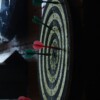In the past year or so, six graduates of Baylor University’s English graduate program have published books about the arts of reading well and the value of forming Christian imaginations. Jessica Hooten Wilson (grad of 2009) published Reading for the Love of God: How to Read as a Spiritual Practice (Jessica has also published several other books on related topics); Rachel B. Griffis (grad of 2016), Julie Ooms (grad of 2014), and Rachel M. De Smith Roberts (grad of 2016) published Deep Reading: Practices to Subvert the Vices of Our Distracted, Hostile, and Consumeristic Age; Lanta Davis (grad of 2013) published Becoming by Beholding: The Power of the Imagination in Spiritual Formation; and Jeffrey Bilbro (grad of 2012) published Words for Conviviality: Media Technologies and Practices of Hope. What was in the Waco water that shaped people who want to study the craft of reading and who seek, ultimately, to bear witness to the beauty of Christian truth?
Several of us have corresponded about these questions in recent weeks, and two of us have drafted the following prosopography, which the Oxford English Dictionary defines as the study of “the public careers and relationships of a group in a particular place and period; a collective biography.” This word and approach was a favorite of Dr. Stephen Prickett, one of our professors at Baylor. In what follows, we don’t pretend to speak for the institution or for all our peers in the program. We aren’t trying to toot our own horns or shill for Baylor’s English graduate programs. But in a moment when graduate study in the humanities faces existential economic pressures, we want to reflect on the value of intellectual communities that cultivate people who love both words and the Word.
In the concluding keynote at a recent conference, “Renewing Mind and Heart: Questions for the Next Generation in Christian Higher Education,” Jessica Hooten Wilson urged Christian educators to be witness bearers, and several of her points shed light on what made the Baylor English graduate program unusual.
First, Jessica emphasized the humility inherent to the posture of bearing witness. Bearing witness means that you seek to understand before you critique. This stance has gained more defenders in recent years with the postcritique movement led by people such as Rita Felski, but this seems like one of the values nurtured in most of our grad classes.
In educators’ efforts to encourage critical thinking, the emphasis can sometimes land too heavily upon the “critical” element, as if we aren’t thinking unless we’re criticizing. In the rush to critique, we neglect the prior call to understand. But if all we ever do is dismantle, we are left only with fragments, shards, and destruction. We no longer have anything to stand under, much less stand upon. We can read Shakespeare with an eye to complain about a perceived lack of agency in his female characters. Or we can read Shakespeare to appreciate the complex world he creates, the beauty of his language, and the questions he poses about the human condition. At Baylor, we took texts seriously, as a whole, and as something worth reading. We read and discussed them first as works that deserved our attention, as art that could magnify our souls and equip us to see the world more clearly. It’s not that questions about female agency aren’t valid or important, but by first opening ourselves to what the texts could teach us, we approached them humbly and with charity. A text may be imperfect because the world is imperfect, but a pedagogy that sees literature as a window to the world, a way of seeing more clearly, helps us treat art as something to cherish and appreciate, not as something to dismantle.
Perhaps one of the reasons this culture of humble learning prevailed was the non-elite status of the Baylor English grad program; most of us grad students didn’t come from Ivy League or prestigious undergrad programs; we weren’t (mal)formed by years of uber-competitive elite education. Some of us even started our college careers at community colleges or regional state schools. What we lacked in competitive, meritocratic striving, though, we made up for with an earnest desire to pursue truth. Many of us remember fondly the collegial atmosphere of the grad student culture and the many intense conversations in the TA rooms, the Writing Center, or the library basement over what we were reading and wrestling with. The books we were reading and the ideas we were developing mattered, but the relationships they shaped and were shaped by mattered just as much.
This collegial attitude was modeled for us by many professors. I (Jeff) learned much from respected scholars such as David Lyle Jeffrey who made teaching and mentoring a priority even when the professional guild places more emphasis on research. Nancy Chinn had all the students from her Willa Cather class over to her home, and I now regularly look for opportunities to host students. Sarah Ford patiently helped me hone very rough essays into publishable ones.
Many Baylor professors likewise became pedagogical models for me (Lanta). Luke Ferretter had an infectious energy, and a way of teaching that helped me see that the book I didn’t think was all that great before I entered the classroom was actually one of the best things I’d ever read. Greg Garrett’s teaching style was infused with kindness and compassion, such that I always felt as if he really saw each of his students. I entered graduate school with very little confidence and often felt behind my classmates, but Ferretter and Garrett both allowed me space to be creative and encouraged that in ways that helped me believe I’d find my place in the academy. Richard Russell helped me find my voice as a writer by reminding me of some of the basics, like the importance of clear topic sentences. I also would not have had the opportunity to do my Fulbright in Northern Ireland if not for his expertise, which sparked my interest in Troubles literature.
While graduate school may not have been anxiety free, our collegiality meant that we felt free to share ideas, to be creative, and to take risks. During the first semester of teaching composition classes at Baylor, other graduate students passed on what had worked for them. They shared good pedagogy and offered their lesson plans, syllabi, and any other tips, tricks, and strategies they had learned along the way. We gathered for Bible studies in our apartments, book discussions in coffee shops, and cookouts in the park. In extremely competitive environments, there can be a culture of hoarding, of wanting to stand out and therefore keep one’s good ideas for one’s self. Our teaching and research today remain indebted to this community: the book referrals, the ideas sparked from conversations around the table, the teaching practices developed in our TA office, and our ongoing correspondences.
A second point that Jessica emphasized in her talk is that Christian scholars need to bear witness, ultimately, to the crucified and risen Christ. Ralph Wood would show classes Grunewald’s Isenheim altarpiece with John the Baptist’s long finger pointing determinedly toward Christ on the cross. There was a core of quite confessional scholars and students who shaped the department culture. In part this was due to the Religion and Literature program, and in part it stemmed from the interests of professors such as David Lyle Jeffrey, Ralph Wood, Jim Barcas, Phil Donnelly, Luke Ferretter, Greg Garrett, Joe Fulton, Josh King, Richard Russell, and others, both within the English department and in adjacent departments. These scholars (and many of the students they graduated) were not just Christians doing good scholarship (which is not at all a bad thing, of course); they were Christians seeking to understand and commend works of literary and visual beauty that point the way toward Christ. They self-consciously understood themselves as standing in the tradition that David Lyle Jeffrey outlines in People of the Book: Christian Identity and Literary Culture. For such people, the biblical tradition was primary to understanding and weighing the literary tradition.
Scholarship, in this way of thinking, is not a narrow, isolated thing meant for a very small audience. It is for the good of the Church. To put religion in conversation with literature required us to develop a theological vocabulary proficient enough to begin that conversation. Our professors were experts in their field, but they spoke across disciplinary lines. We were being invited to ask questions that the church or the wider culture was (or should be) asking.
Baylor’s Religion and Literature program did this naturally, but the university as a whole also supported interdisciplinary work through co-curricular programming. The Institute for Faith and Learning invited graduate students from several disciplines to investigate questions of faith and scholarship together. A special seminar on Religion and Culture put graduate students from multiple disciplines into a room together to learn from faculty from across the university–in history, sociology, literature, theology, philosophy–whose scholarship was always in conversation with faith. While not all of us participated in these programs, they encouraged cross-disciplinary conversations and acted as a kind of leaven, in that those who did participate brought some of the questions, knowledge, and strategies back to their discipline.
What was the fruit of this program, marked by these two features? First, it’s produced people who care about the mission of Christian education more broadly. Several graduates of the program contributed to The Liberating Arts: Why We Need Liberal Arts Education, and others have written essays defending the value of Christian education. Many more work at CCCU schools or in classical Christian schools. We found our education deeply transformed us, and so we want to share that with others, practicing and advocating a formational vision of education. Education isn’t only about preparing students for careers but helping them become virtuous, liberated people. We certainly strive to develop and share subject-matter expertise, but we also care deeply about the habits, practices, and telos of education. Our graduate studies required us to master the “what,” but it also invited us to contemplate the “how” and the “why.”
Further, as the books listed in the opening paragraph indicate, many graduates of this program take on public-facing writing that seeks to bear witness to the beauty of Christ’s life and kingdom. In addition to the narrower focus on the arts of reading well, Alan Noble’s (grad of 2013) work is a prime example of this; tellingly, Alan’s first book was titled Disruptive Witness. In his talk at the Renewing Mind and Heart conference, Jamie Smith made a comment (summarizing things he’s written elsewhere about the value of public scholarship), that Christian academics need to publish work that fills in the space between Princeton UP books and Max Lucado. (In Brad East’s related taxonomy, this would be Tier 2 and 3 books.) A lot of Baylor English graduates publish books and essays aimed at the Christians in the pews rather than other scholars. Alan Noble co-founded Christ and Pop Culture, and Jeff Bilbro edits the Front Porch Republic; both of these outlets regularly publish other Baylor English graduates.
And of course there are ways to bear witness that don’t involve publishing. Many graduates labor faithfully in the classrooms of CCCU schools or classical schools, and several work in the church in various roles. Regardless of our careers, though, most of us in one way or another are seeking to bear faithful witness to the beauty of Christ and his kingdom. This work of bearing witness is far more important and valuable than any line on a CV or prestigious job title.
There are several implications to this brief prosopography. One is that bearing witness in this way is subtly different from much of the exvangelical movement in recent years that focuses on critiquing the failings of various Christian institutions and cultures. That’s necessary work, but the kind of project that, for instance, Becoming by Beholding and Reading for the Love of God represent is subtly but significantly different: Here are good testimonies. Look at them. Be formed by them. Again, this is a Christian instance of the postcritique posture, of scholarship in the service of edification.
A second is a more sobering one: can such formational graduate education be sustained? The biggest obstacle to such a program is the bleak landscape of Christian higher education, particularly in the humanities. We cannot in good conscience recommend graduate study in English as a viable career path to even exceptionally bright undergraduate students. In my (Jeff’s) case, having my tenured position eliminated brought this reality home in a stark way. Further, a professor and scholar like David Lyle Jeffrey doesn’t really have a successor–who else shows up at Princeton having to decide between graduate study in English and graduate study in Physics? But from what we hear, Baylor continues to draw earnest, intelligent students to study English, and their graduates continue to find jobs in Christian liberal arts colleges, classical schools, and elsewhere. Regardless of the real challenges such programs face, the Church needs academic institutions that will form scholars to be faithful, compelling witnesses to Christ and his kingdom.























